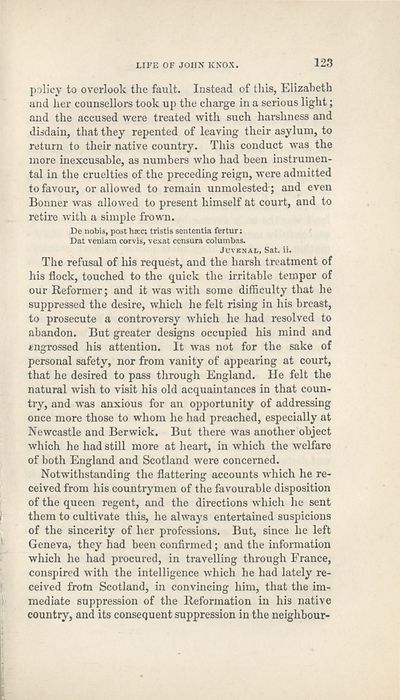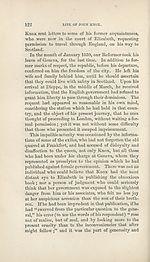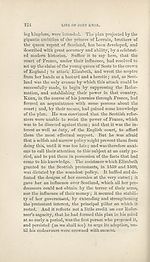Download files
Complete book:
Individual page:
Thumbnail gallery: Grid view | List view

LIFE OF JOHN KNOX.
123
policy to overlook the fault. Instead of this, Elizabeth
and her counsellors took up the charge in a serious light;
and the accused were treated with such harshness and
disdain, that they repented of leaving their asylum, to
return to their native country. This conduct was the
more inexcusable, as numbers who had been instrumen¬
tal in the cruelties of the preceding reign, were admitted
to favour, or allowed to remain unmolested; and even
Bonner was allowed to present himself at court, and to
retire with a simple frown.
De nobis, post tisec; tristis sententia fertur:
Dat veniam corvis, vexat censura columbas.
Juvenal, Sat. ii.
The refusal of his request, and the harsh treatment of
his flock, touched to the quick the irritable temper of
our Reformer; and it was with some difficulty that he
suppressed the desire, which he felt rising in his breast,
to prosecute a controversy which he had resolved to
abandon. But greater designs occupied his mind and
engrossed his attention. It was not for the sake of
personal safety, nor from vanity of appearing at court,
that he desired to pass through England. He felt the
natural wish to visit his old acquaintances in that coun¬
try, and was anxious for an opportunity of addressing
once more those to whom he had preached, especially at
Newcastle and Berwick. But there was another object
which he had still more at heart, in which the welfare
of both England and Scotland were concerned.
Notwithstanding the flattering accounts which he re¬
ceived from his countrymen of the favourable disposition
of the queen regent, and the directions which he sent
them to cultivate this, he always entertained suspicions
of the sincerity of her professions. But, since he left
Geneva, they had been confirmed; and the information
which he had procured, in travelling through France,
conspired with the intelligence which he had lately re¬
ceived from Scotland, in convincing him, that the im¬
mediate suppression of the Reformation in his native
country, and its consequent suppression in the neighbour-
123
policy to overlook the fault. Instead of this, Elizabeth
and her counsellors took up the charge in a serious light;
and the accused were treated with such harshness and
disdain, that they repented of leaving their asylum, to
return to their native country. This conduct was the
more inexcusable, as numbers who had been instrumen¬
tal in the cruelties of the preceding reign, were admitted
to favour, or allowed to remain unmolested; and even
Bonner was allowed to present himself at court, and to
retire with a simple frown.
De nobis, post tisec; tristis sententia fertur:
Dat veniam corvis, vexat censura columbas.
Juvenal, Sat. ii.
The refusal of his request, and the harsh treatment of
his flock, touched to the quick the irritable temper of
our Reformer; and it was with some difficulty that he
suppressed the desire, which he felt rising in his breast,
to prosecute a controversy which he had resolved to
abandon. But greater designs occupied his mind and
engrossed his attention. It was not for the sake of
personal safety, nor from vanity of appearing at court,
that he desired to pass through England. He felt the
natural wish to visit his old acquaintances in that coun¬
try, and was anxious for an opportunity of addressing
once more those to whom he had preached, especially at
Newcastle and Berwick. But there was another object
which he had still more at heart, in which the welfare
of both England and Scotland were concerned.
Notwithstanding the flattering accounts which he re¬
ceived from his countrymen of the favourable disposition
of the queen regent, and the directions which he sent
them to cultivate this, he always entertained suspicions
of the sincerity of her professions. But, since he left
Geneva, they had been confirmed; and the information
which he had procured, in travelling through France,
conspired with the intelligence which he had lately re¬
ceived from Scotland, in convincing him, that the im¬
mediate suppression of the Reformation in his native
country, and its consequent suppression in the neighbour-
Set display mode to:
![]() Universal Viewer |
Universal Viewer | ![]() Mirador |
Large image | Transcription
Mirador |
Large image | Transcription
| Antiquarian books of Scotland > Scotland/Scots > Life of John Knox ; and, The life of Alexander Henderson > (141) |
|---|
| Permanent URL | https://digital.nls.uk/131833996 |
|---|
| Description | Thousands of printed books from the Antiquarian Books of Scotland collection which dates from 1641 to the 1980s. The collection consists of 14,800 books which were published in Scotland or have a Scottish connection, e.g. through the author, printer or owner. Subjects covered include sport, education, diseases, adventure, occupations, Jacobites, politics and religion. Among the 29 languages represented are English, Gaelic, Italian, French, Russian and Swedish. |
|---|

